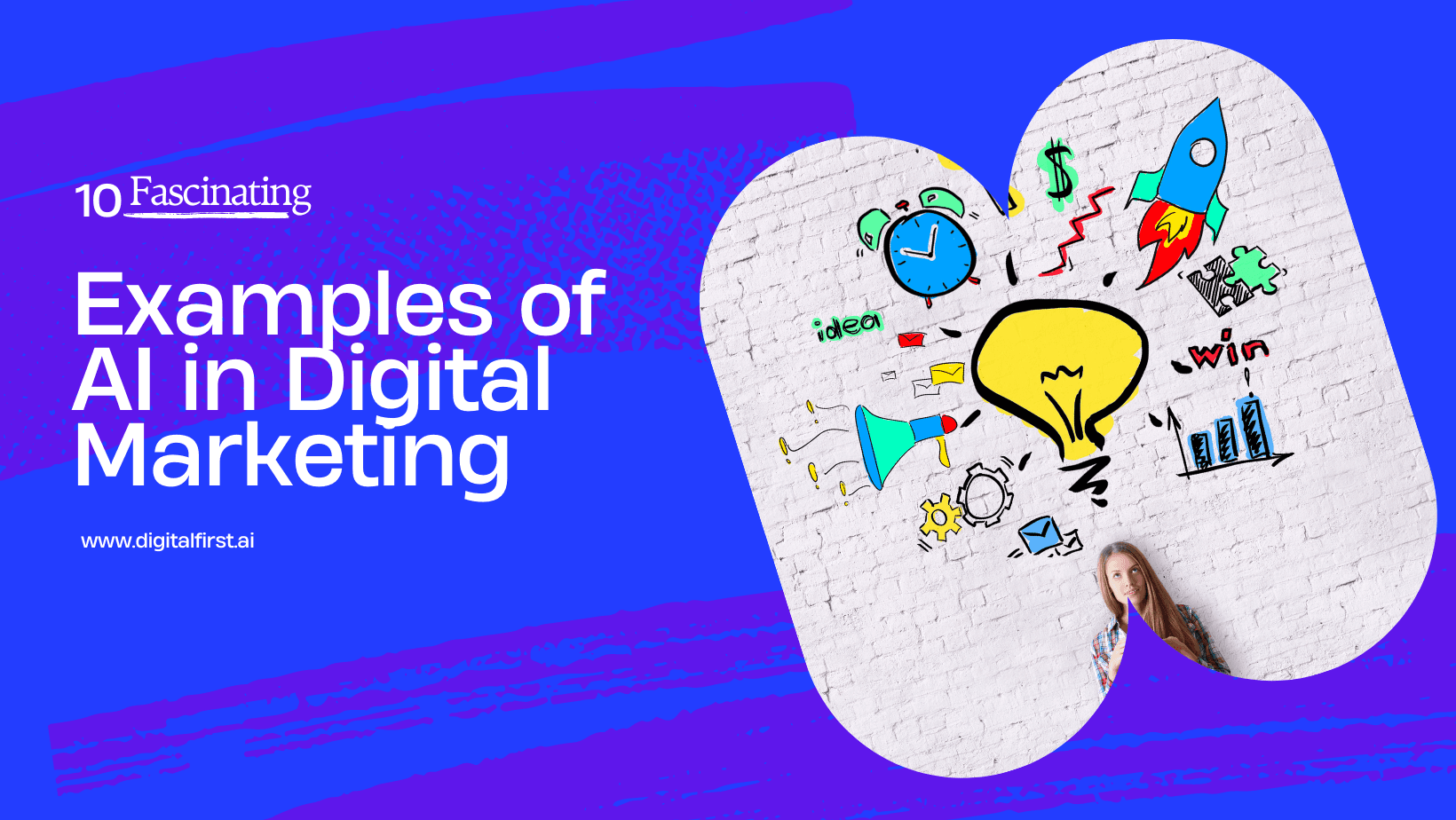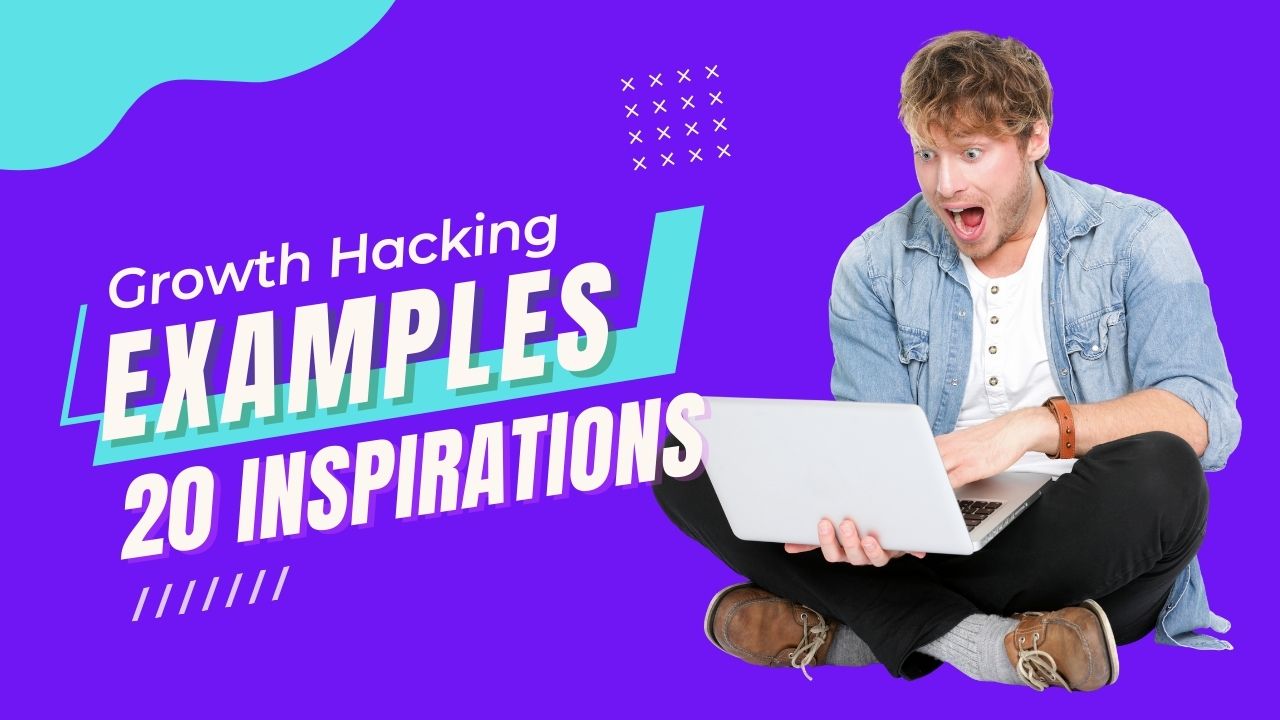10 Fascinating Use Cases and Examples of AI in Digital Marketing
In this blog, I'll be sharing 10 fascinating examples of AI in digital marketing that will blow your mind. So buckle up and get ready for an incredible ride!
Sonu kalwar
Share:
Have you ever wondered how the Terminator would do in the world of marketing? Well, luckily for us, we don't have to worry about a cyborg takeover just yet.
But what we do have is artificial intelligence (AI) taking over the digital marketing world with some fascinating use cases and examples.
Over 60% of marketers have used generative AI in their digital marketing activities, with 44.4% using AI for content production.
And, McKinsey Global Institute estimates an impact of $1.4 trillion to $2.6 trillion in the marketing and sales function across all industries due to the use of AI in marketing.
Think of AI as your trusty sidekick, the Robin to your Batman. It's there to help you save the day and make your marketing efforts more efficient and effective.
But how exactly can AI help you achieve your marketing goals?
In this blog, I'll be sharing 10 fascinating examples of AI in digital marketing that will blow your mind. So buckle up and get ready for an incredible ride!
Try Digital First AI's Plug & Play AI-Powered Marketing Workflows Builder

No credit card needed. Instant access. Try now for free.
Use cases of AI in marketing automation
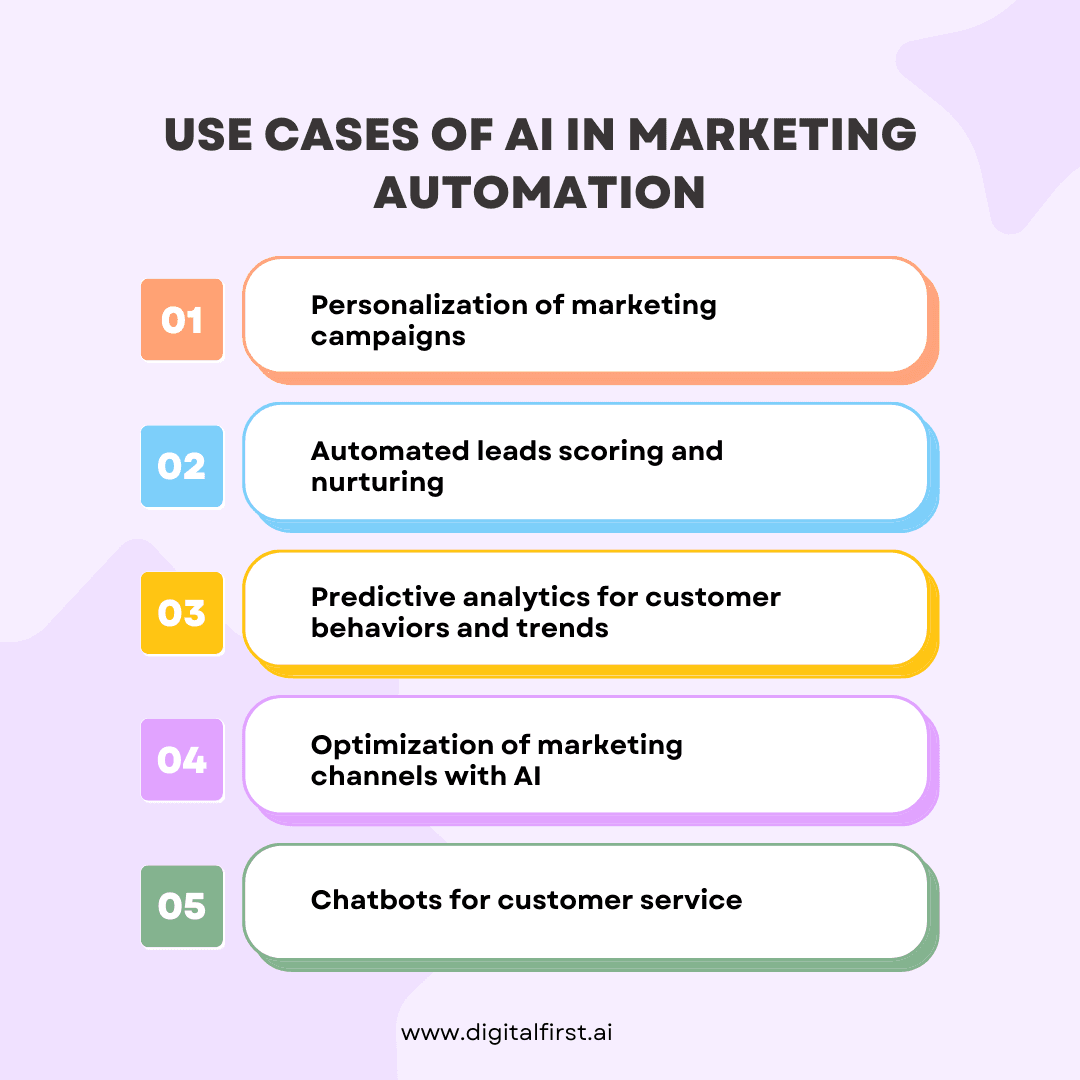
AI has already revolutionized marketing automation, and its applications are vast and varied. One example is the use of AI in chatbots.
Chatbots are AI-powered virtual assistants that can engage with customers, answer their questions, and even guide them through the buying process.
This improves the customer experience and can lead to increased sales.
Another example is the use of AI in email marketing. With AI-powered tools, you can examine customer data and generate personalized emails that have a higher chance of resonating with the recipients.
This leads to more opens, clicks, and ultimately, conversions.
AI is also applied to social media marketing in order to track trends and analyze consumer feedback. This can assist companies in producing more audience-resonant, relevant, and engaging content.
Custom marketing campaigns
With AI, you can develop custom marketing campaigns that cater to your particular requirements, target audience, and budget.
AI technology can scrutinize customer data, forecast consumer behavior, and develop personalized messaging that resonates with your customers. This lets you fine-tune your marketing efforts, boost your ROI, and generate more sales.
Plus, AI can automate the implementation of marketing campaigns, which saves you valuable time and resources. With AI, you can accomplish more efficiency, effectiveness, and triumph in your marketing campaigns.
Personalized marketing messages
Creating personalized marketing messages is an excellent way to connect with customers and drive engagement. But crafting tailored messages for each customer can be a daunting task.
Thankfully, AI can make the process smoother. By utilizing AI in marketing automation, businesses can analyze customer data and behavior to create custom messages that resonate with each customer.
For instance, AI can segment customers based on demographics, location, and interests to create targeted campaigns.
Chatbots are another great example of AI in marketing automation that can deliver personalized customer service.
Automated email campaigns
If you're running a business, you'll know that email campaigns are crucial for getting your message across.
But let's face it, creating email campaigns that hit the right spot with your customers can be tough and time-consuming. Luckily, that's where AI comes in.
AI can make the process of creating effective email campaigns a breeze.
With AI-powered marketing automation, you'll be able to personalize your email campaigns based on your customers' behavior, preferences, interests, and demographics.
Plus, AI can optimize your email content and subject lines to get more opens and clicks. And if you're in eCommerce, AI can analyze your customer data and recommend the most relevant products for cross-selling and up-selling. Pretty cool, right?
AI-powered chatbots
I'll admit, creating chatbots that provide a seamless and personalized experience can be a complex task.
But that's where AI comes in - using natural language processing and machine learning, it creates chatbots that can understand and respond to customer queries in real time.
You'll see businesses using chatbots for everything from answering FAQs to processing orders and providing recommendations.
And some, like Sephora and Bank of America, are even using chatbots for personalized services!
Examples of AI in marketing automation
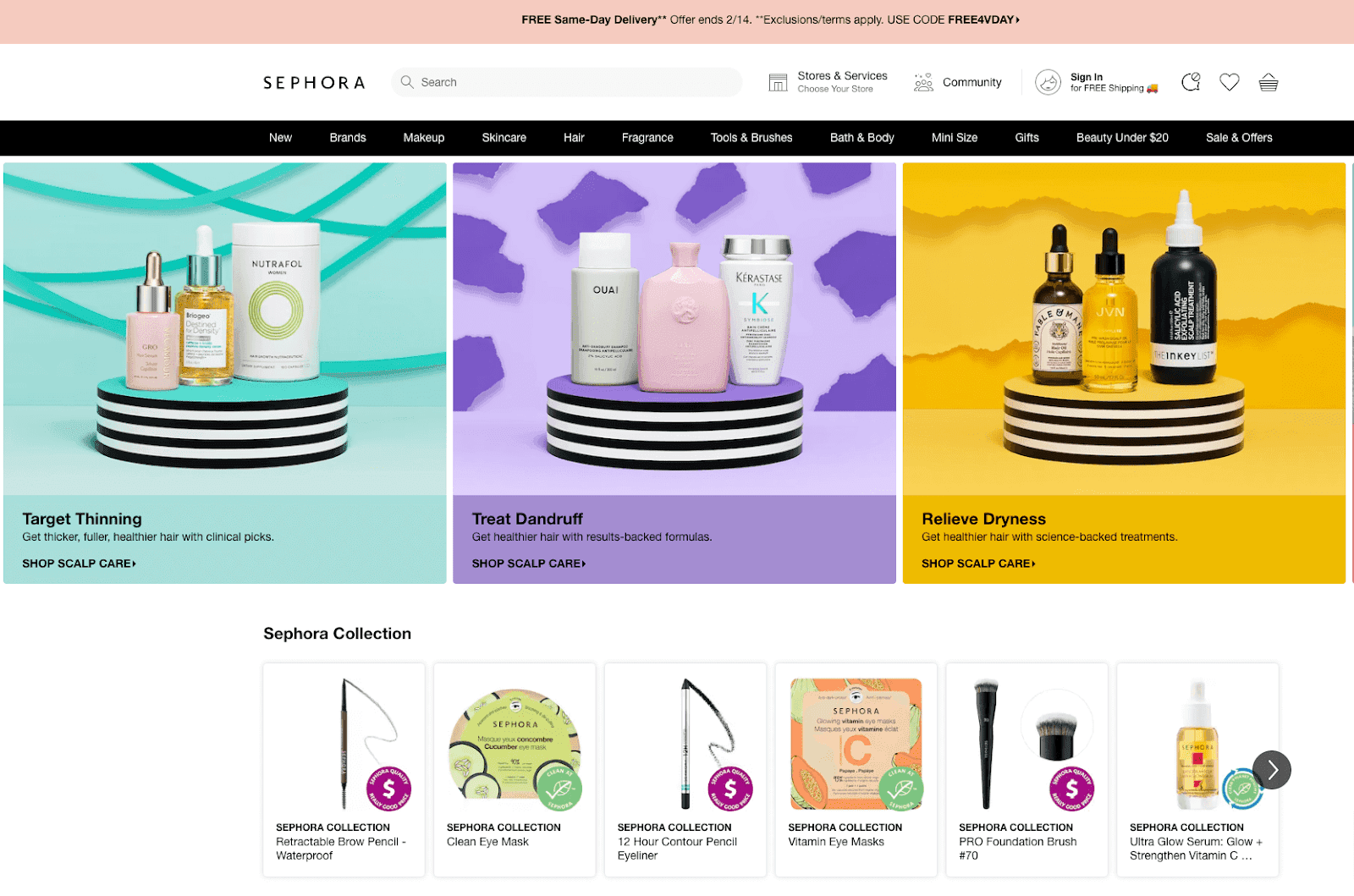
Sephora is using AI-powered chatbots to provide personalized recommendations to customers based on their skin type, preferences, and purchase history.
The chatbot can also answer frequently asked questions and provide beauty tips and tutorials. This has improved customer engagement and satisfaction while also reducing the load on customer service representatives.
Digital First AI for marketing automation
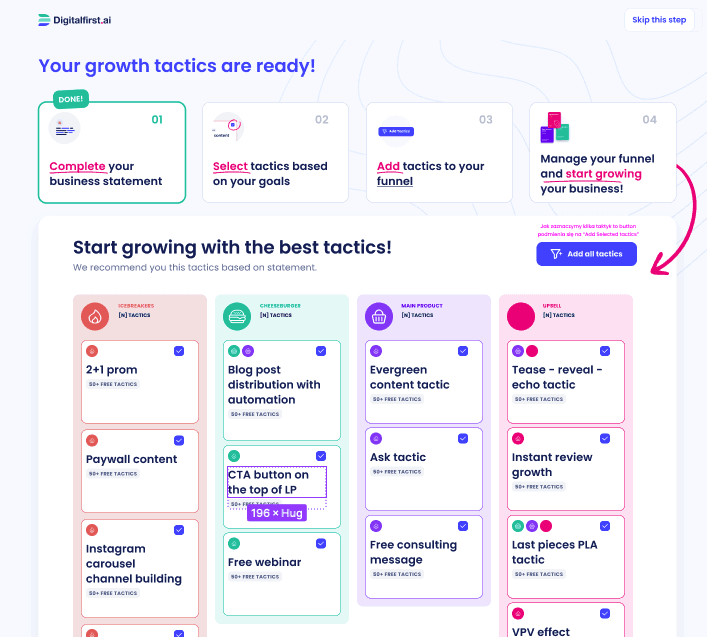
Over 15,000 marketers and entrepreneurs in 60+ countries trust Digital First AI as their go to marketing tool.
Our platform provides personalized marketing recommendations based on your business model, ensuring that your marketing efforts are optimized for maximum growth.
And guess what? Digital First AI's can generate high-quality blog posts, social media content, and website copy automatically - taking the burden of content creation off your shoulders.
Here's an example of how you can use Digital First AI for marketing automation:
Let's say you're launching a new product and need to create a marketing campaign to promote it. No worries - you can use Digital First AI to automate the entire process.
First, the platform will analyze your business's data and identify your target audience. It will then recommend personalized marketing tactics that have been proven to work for similar businesses in your industry.
Once you select the recommended tactics, Digital First AI will help you create a custom marketing funnel.
Our platform can even assign tasks to team members, provide guidance on the execution of strategies, and generate marketing materials such as ad copies, lead magnets, and designs with AI.
As your campaign progresses, Digital First AI will track the performance of each tactic and provide real-time analytics that show which strategies are driving the most engagement and revenue.
It will also provide permanent growth recommendations that can help your business improve its marketing efforts in the long term.
Digital First AI's marketing automation platform can help you save time, increase efficiency, and generate revenue faster by automating the entire marketing process with the help of AI.
Use cases of AI in paid advertising
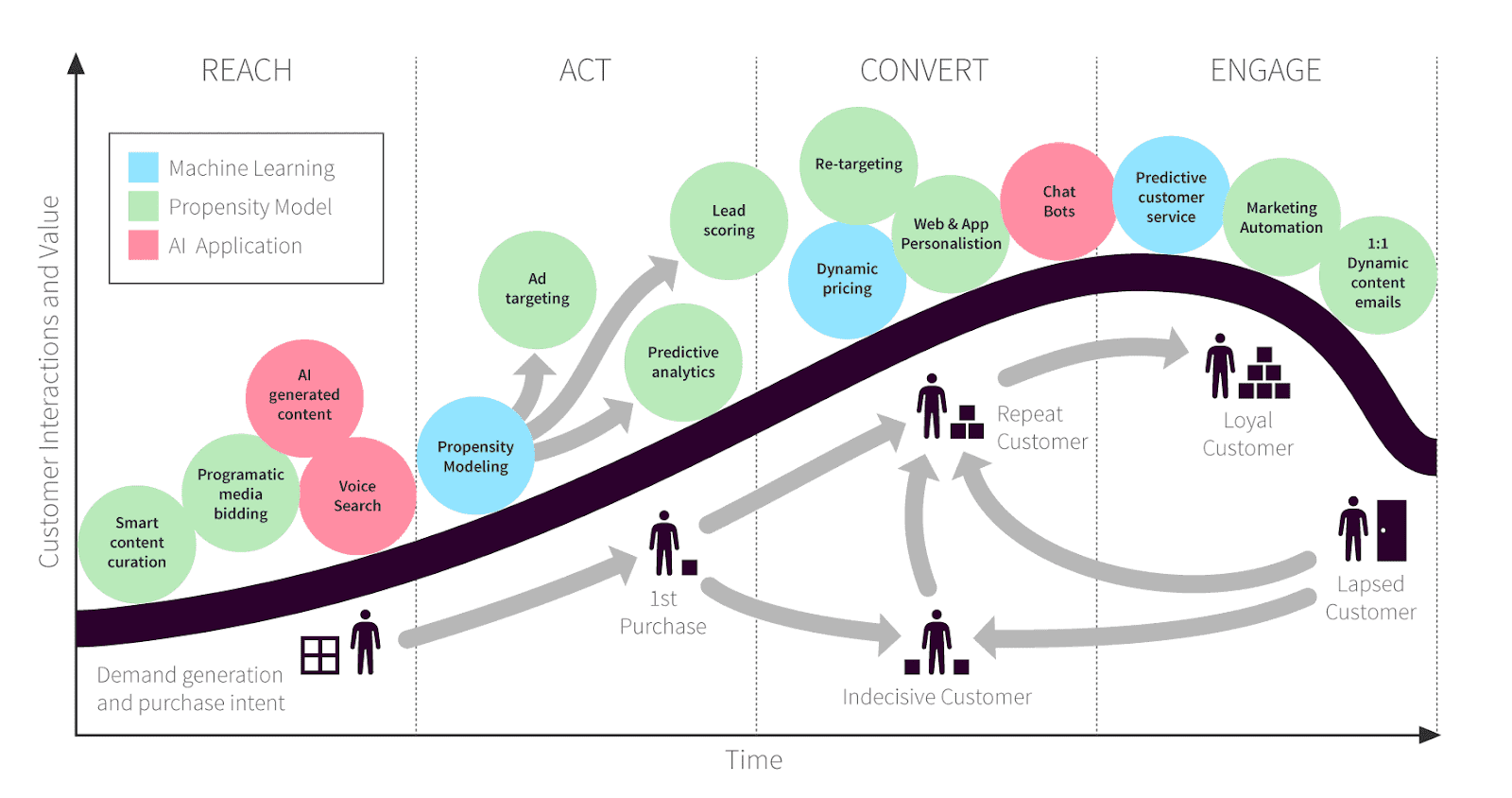
AI is transforming the world of paid advertising, giving marketers a powerful tool to optimize their campaigns and target their audience more effectively.
Let me give you an example. If you're someone who frequently purchases Italian ingredients, you may receive a targeted promo code for related products. This type of tailored messaging helps increase customer engagement and drive sales.
Similarly, Adext AI uses machine learning algorithms to optimize ad campaigns across multiple platforms, resulting in a 40% increase in conversions and a 26% reduction in costs for its clients.
With AI tools like these, you can make data-driven decisions, automate time-consuming tasks, and achieve better results with less effort.
AI-generated ad copy
AI-generated ad copy is already gaining popularity in the world of paid advertising. That's because the traditional way of creating ad copy can be a real time and money drain.
I'll be honest, many businesses struggle to create effective ad copy that speaks to their audience, which can result in wasted ad spend.
But that's where AI steps in to help. By automating the process, AI can create copy that is personalized and targeted to each individual user.
Some examples of AI-generated ad copy are Google's responsive search ads, which use machine learning to adapt to the user's search query, and Persado, a platform that uses AI to create emotionally resonant ad copy.
By incorporating AI into your paid advertising, you can expect more effective campaigns, higher engagement, and ultimately increased ROI.
Automated ad targeting
With the help of AI, you can now identify and serve ads to the right audience at the right time.
This approach solves the problem of inefficient targeting and wasted ad spend, which can occur when ads are shown to the wrong audience.
By using AI, you can analyze vast amounts of data on user behavior and preferences to create highly targeted campaigns.
Some examples of automated ad targeting include Facebook's Lookalike Audiences, which uses AI to identify users who are similar to your existing customers, and Google's Smart Display campaigns, which use machine learning to optimize ad placement for maximum impact.
Ad optimization
Ad optimization is all about refining and improving your campaigns to achieve better results. This involves analyzing metrics like click-through rates, conversion rates, and cost per click to identify areas for improvement.
But, let's be real, doing this manually can take a lot of time and effort. That's why AI is critical to ad optimization.
With the help of AI, you can analyze large amounts of data quickly and make real-time adjustments to campaigns based on user behavior.
For example, Google's AdWords uses AI to optimize ad placements based on user intent and behavior, while Facebook's Dynamic Ads use machine learning to personalize ad content based on user preferences.
By incorporating AI into your ad optimization strategy, you can expect better-targeted campaigns, increased ROI, and improved overall ad performance.
And, trust me, visual aids like graphs and charts can really help illustrate the impact of AI on ad optimization.
Examples of AI in paid advertising
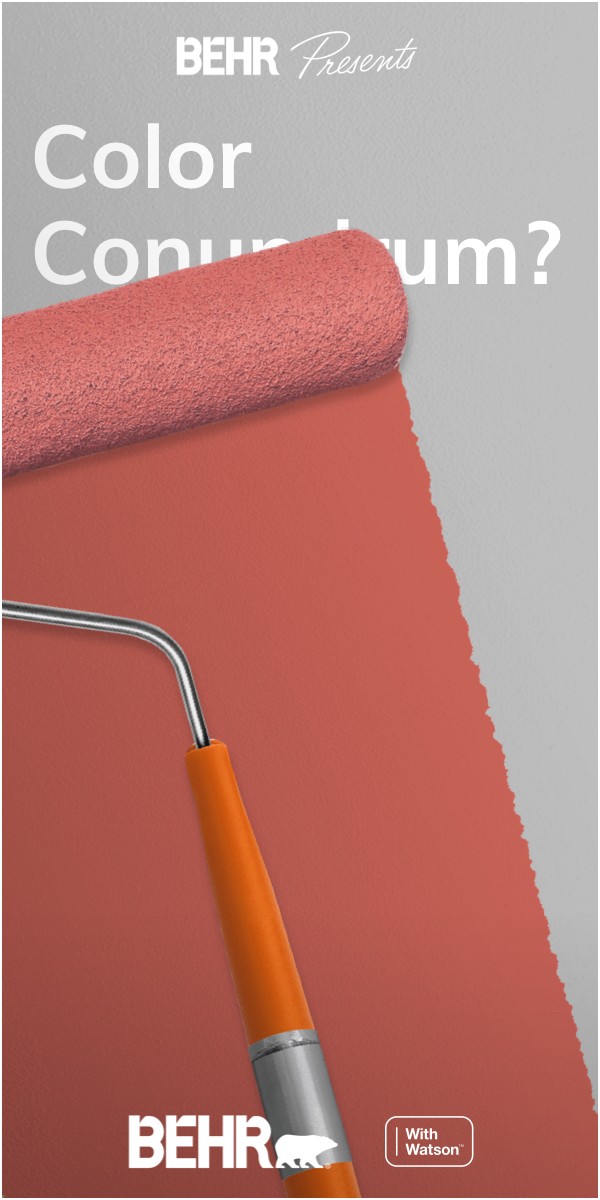
Behr and HOLT CAT are two examples of consumer companies that are using AI for paid advertising.
Behr, a paint manufacturing company, has leveraged AI-powered programmatic advertising to optimize their ad targeting and improve their campaign performance.
HOLT CAT, a construction equipment supplier, uses AI-based chatbots to provide personalized recommendations to customers and improve their engagement rates.
Additionally, many other companies are also using programmatic advertising platforms, which utilize AI to automate the process of buying and selling ad space, to improve their advertising efficiency and effectiveness.
Interactive Investor uses the AI tool Albert to drive more account signups and reduce customer acquisition costs through paid search.
The tool made real-time PPC campaign improvements to demographic targeting, keywords, ad copy, and campaign timing.
The tool created nearly 10,000 different text ads and delivered a 286% increase in keywords, resulting in an 89% share of voice across the top 10 branded terms and a significant drop in cost per acquisition.
Digital First AI for paid advertising

With Digital First AI, you'll get personalized recommendations for the most effective paid marketing tactics for your business. Plus, you'll save a ton of time and effort in the process.
But that's not all - Digital First AI also offers cutting-edge AI copywriting and graphics to generate killer ad copies and designs for your campaigns.
Here are some of the features that make Digital First AI stand out:
automated content creation.
ChatGPT-4 for social media ideas
1000+ marketing strategies
text-to-image generator.
Social media post generator (stories, feeds, posts, ads, and more)
Team collaboration
Advanced analytics (coming soon)
automated ad optimization.
strategy calendar (coming soon).
Tracking Pixel (coming soon)
AI social media videos (coming soon)
Use cases of AI in copywriting

These days, AI copywriting tools are an essential tool in copywriting, helping businesses like yours create content that truly resonates with their target audience.
One of the biggest challenges in content creation is personalization. But with the help of AI algorithms, you'll be able to analyze user data and create personalized messaging that really hits home.
That means your content will be more engaging, more relevant, and more likely to drive conversions.
Take Phrasee, for example. It's an AI-powered platform that uses machine learning to optimize email subject lines, resulting in higher open rates and conversions.
And then there's Digital First AI, an AI powered marketing tool that also generates high-quality content for social media, blog posts, and ad copy.
With AI in your corner, you'll save time and resources while creating effective content that really drives engagement and conversions.
Blog post
AI has changed the game of content creation. It's made things faster, more efficient, and way cheaper!
Traditional content writing can be a real hassle, taking up too much time and money. But thanks to AI, all that has changed.
With the power of AI, businesses can crank out more content than ever before without having to worry about wasting precious resources.
Plus, AI can help create copy that's personalized and engaging based on the user's behavior and preferences.
Product descriptions
Using AI-powered writing tools, you'll be able to generate engaging product descriptions in a flash.
These tools use natural language processing (NLP) algorithms to analyze product features, benefits, and user reviews, ensuring that your descriptions resonate with your target audience.
And there are plenty of options to choose from - Digitalfirst.ai can generate descriptions for a range of industries, like fashion, technology, and beauty.
Other tools, like MarketMuse and Acrolinx, can analyze your existing content and provide suggestions for improvement.
With AI on your side, you'll be able to create killer product descriptions that drive conversions without breaking a sweat.
Ad copywriting - AIDA, P-A-S & more
With AI, you can quickly and easily generate multiple versions of your ad copy, allowing you to experiment with different messaging and targeting strategies.
AIDA, PAS, BAB, FAB, the 4 P's, PASTOR, and QUEST are all powerful frameworks that can help take your ad copywriting to the next level.
AIDA
AIDA (Attention, Interest, Desire, Action) is a framework that helps you to structure your ad copy in a way that grabs the reader's attention, builds their interest, creates a desire for your product or service, and then prompts them to take action.
PAS
PAS (Problem, Agitate, and Solution) is another framework that can be used to create effective ad copy. It involves identifying a problem that your target audience faces, agitating that problem to increase their pain points, and then presenting your solution.
BAB
Before After Bridge (BAB) is a framework that involves presenting the reader with their current undesirable situation, then showing them a vision of what their life could be like after using your product or service, and then bridging the gap between the two with your solution.
FAB
FAB (Features, Advantages, and Benefits) is a framework that helps you to highlight the unique features of your product or service, the advantages that those features offer, and the benefits that the customer will receive.
4 P's
The 4 P's (Product, Price, Promotion, and Place) is a framework that helps businesses to create a comprehensive marketing strategy by focusing on the essential elements of their product or service.
PASTOR
PASTOR (Problem, Amplify, Story, Testimonials, Offer, and Response) is a framework that involves identifying a problem, amplifying the pain points, telling a story that resonates with the target audience, highlighting testimonials, making an offer, and prompting a response.
QUEST
QUEST (qualify, understand, educate, stimulate, and transition) is a framework that helps businesses guide the reader through a journey that qualifies them as potential customers, helps them understand why they need the product or service, educates them about the benefits, stimulates their desire, and transitions them to take action.
Email copywriting
Tools such as Phrasee and Persado are designed to generate personalized and effective email copy that speaks directly to your customers.
With the help of machine learning algorithms, they analyze your customer data and behavior to optimize the language in your email subject lines, pre-headers, and body text.
The result? engaging content that's sure to improve your conversion rates. Best of all, by using these tools, you'll be able to save time and resources while still increasing engagement and revenue.
Examples of AI in copywriting

HOMFurniture's incorporation of AI in their copywriting process has proved to be a game-changer for their business.
With the help of AI-powered copywriting tools, the company has been able to generate high-quality, engaging, and personalized product descriptions for their e-commerce website at an unprecedented speed.
Digital First AI for copywriting
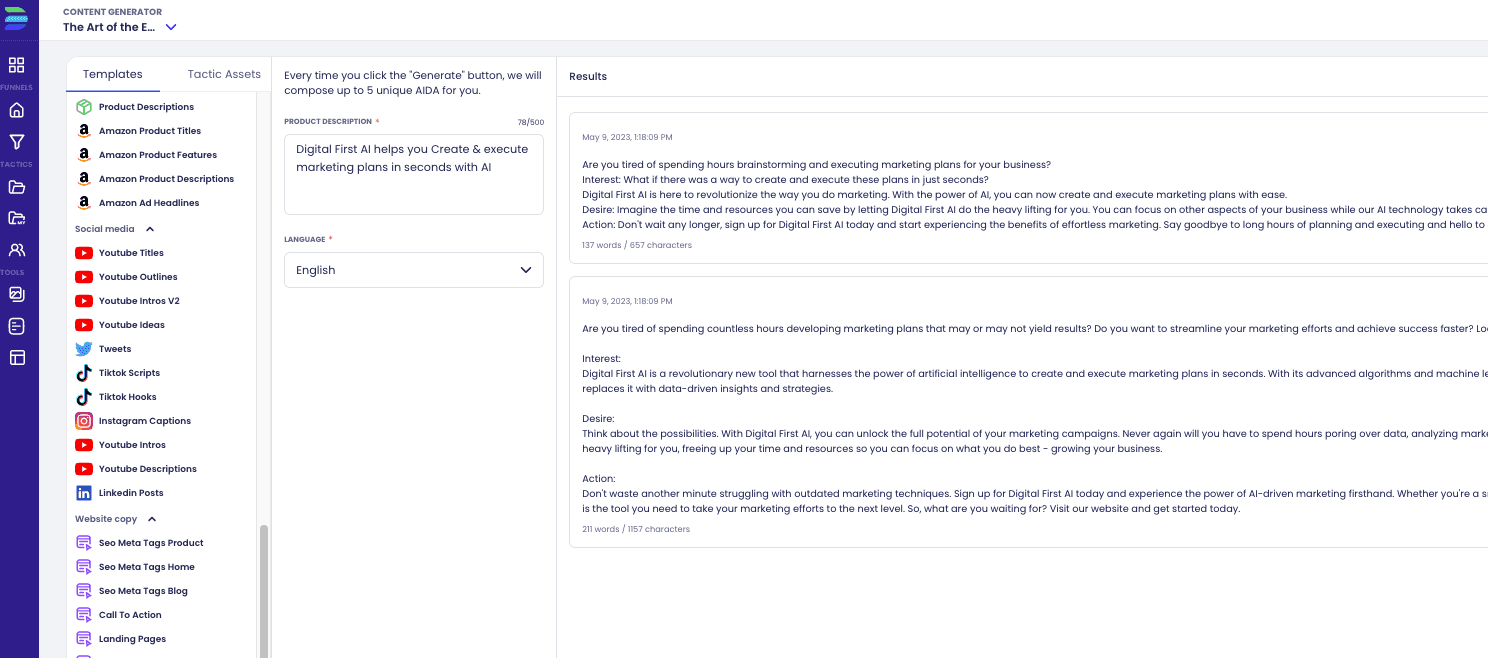
Digital First AI is a user-friendly platform that uses AI-powered tools to help you create high-quality content quickly and easily.
Our tool offers easy-to-use templates for social media pages, blogs, websites, and lead magnets, as well as marketing assistant chatbots powered by ChatGPT-4.
With its unique features, like the tone changer and passive to active voice, our tool can really enhance your writing and brand identity.
Content writing tools offered by Digital First AI:
Marketing Assistant: Generate content or ideas based on your prompts. more like your conversational assistant.
Ad copywriting: LinkedIn, Facebook, Google, and more
General copywriting: AIDA, P-A-S, content rephrasing, and more
E-commerce: product descriptions, Amazon headlines, and more
Social media: YouTube, TikTok, Instagram, LinkedIn, and more
Website copy: landing page, features and benefits, meta title, and more
Other: AIDA, app notifications, growth ideas, and more
Use cases of AI in SEO
You'll be blown away by how generative AI is transforming the world of SEO marketing! In fact, according to Gartner, in just a few years, 30% of all content will be created by AI.
That's right—AI is taking over the world of SEO, from meta descriptions to blog posts and everything in between!
Companies like HubSpot are leading the charge by using generative AI to help businesses optimize their online presence and drive more traffic to their websites.
With their AI-powered Content Strategy Tool, businesses can identify gaps in their content strategy and get actionable insights to improve their SEO efforts.
Automated keyword research
With AI, you'll get quick and accurate keyword analysis, helping you identify the most relevant and impactful keywords for your business.
This means your content will be optimized for the right audience and you'll see a boost in your search engine rankings.
Two top-notch AI-powered keyword research tools are Google Keyword Planner and SEMrush. They use AI to suggest keywords, analyze search volume, and provide insights into the competition.
AI-generated meta descriptions and title tags
Meta descriptions and title tags are key players in boosting your search engine rankings and driving traffic to your website.
Crafting them can be a real challenge and take up valuable time. But with AI, you can sit back and let the algorithms do the work! AI can analyze your content and generate optimized meta descriptions and title tags that are both descriptive and engaging for users.
This means your website's search results will be more enticing to potential visitors, helping you attract more traffic.
Content optimization
Crafting high-quality content that's optimized for search engines is a must for improving search engine rankings and attracting organic traffic, but it's no easy feat.
That's where AI comes in! By analyzing your content, AI can identify areas for improvement and suggest changes to enhance readability, relevance, and structure.
This saves you time and ensures your content is optimized for both search engines and user engagement.
Two game-changing AI-powered content optimization tools are Surfer SEO and MarketMuse. They analyze your content and suggest improvements that can boost search engine rankings and improve user engagement.
Examples of AI in SEO
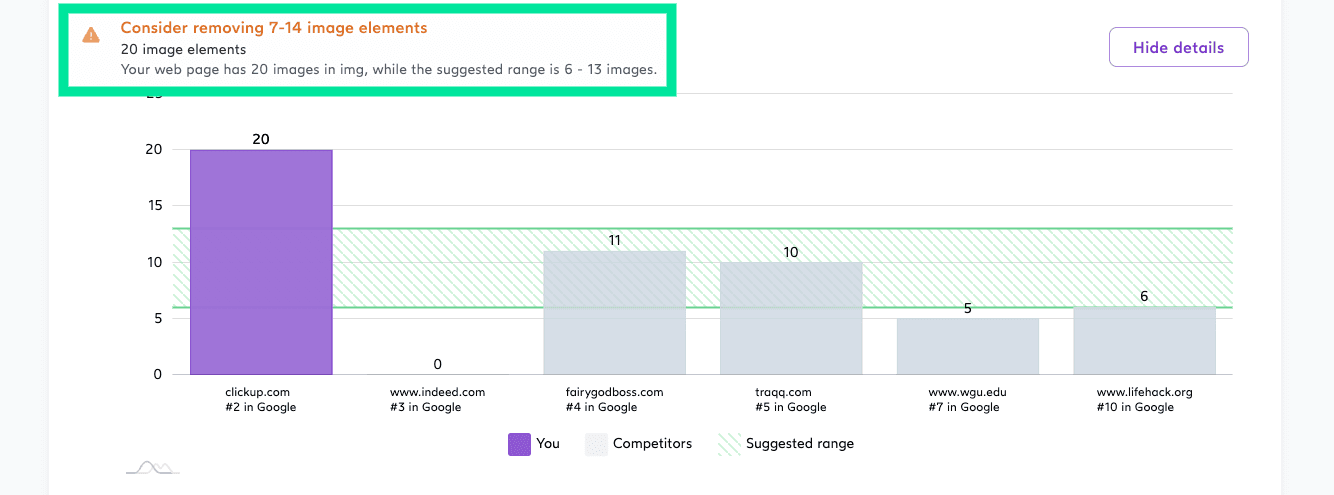
ClickUp uses Surfer SEO's AI tools and machine learning technology to optimize their content.
These tools help identify opportunities for content optimization, suggest appropriate keywords and densities, and provide insights into ideal article structure.
Surfer SEO's technology empowers ClickUp to create SEO-optimized content that improves the user experience and search engine rankings.
AI in graphic design
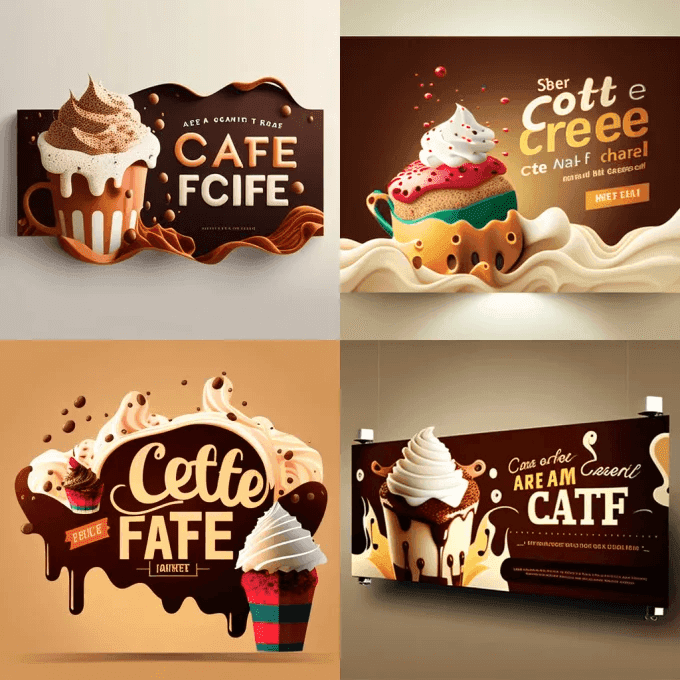
It’s no surprise that AI has made a huge impact on graphic design, as designers can now create stunning visuals with ease and efficiency.
Platforms like DALLE 2 and Midjourney can generate lifelike images and artwork based on a description, while Canva uses AI algorithms to suggest design elements based on your design history.
Adobe's design software also uses AI to automate repetitive tasks like resizing images and selecting fonts. Plus, Tailor Brands uses AI to create unique logos for businesses by analyzing their industry and brand personality.
AI has been used to create album covers, such as the one designed for Taryn Southern by an AI program called Amper Music.
Automated design templates
Designing dope and eye-catching graphics can be a tough nut to crack, especially if you ain't got the design skills.
But hey, AI-powered automated design templates can be the real deal here, making the design process a breeze and more accessible for individuals and businesses alike.
With AI, you'll have a whole library of customizable templates at your fingertips, and you can tweak them to suit your needs. For instance, Canva offers pre-designed templates for social media posts, flyers, business cards, and more.
Another example is Adobe Spark, where you can customize templates for videos, graphics, and web pages.
By using AI-powered automated design templates, you can save time, cut costs, and create top-notch designs.
Personalized design content
Personalized design content is a way to speak directly to your audience with targeted and relevant content.
Traditional graphic design can be expensive and time-consuming, especially if you want to create personalized content for each individual.
AI can automate the process of creating personalized design content by analyzing data and crafting content that is unique to each individual.
Some examples of AI in graphic design include Adobe Photoshop's Content-Aware Fill, Autodesk Fusion 360's Auto-Fill, and Gravit Designer's Live Path Effects toolset.
By using AI in graphic design, you can create high-quality personalized content that resonates with your audience and save time and money in the process.
Examples of AI for graphic design
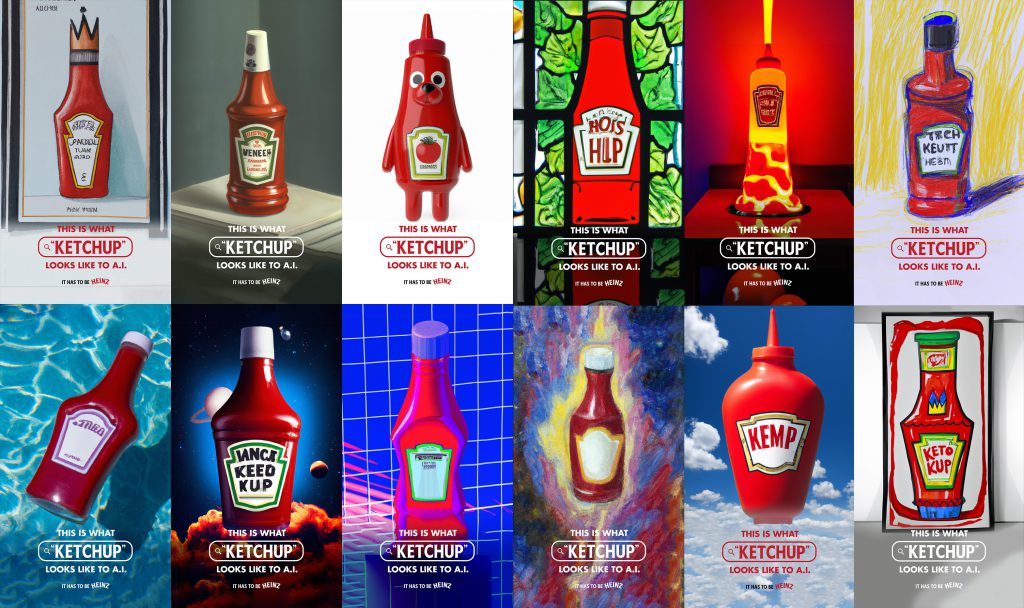
Heinz and Rethink Ideas launched an ad campaign with visuals generated entirely by artificial intelligence.
The campaign was inspired by the AI image generator DALL-E 2, which produced ketchup bottle-like images from ketchup-related prompts.
Consumers were invited to share their own ketchup-based imagery prompts, with the best appearing in social media posts and print ads.
Another example is Coca-Cola's launch of an AI platform called "Create Real Magic," which uses GPT-4 and DALL-E to prompt fans to create their own digital artwork based on branded assets.
The best submissions were displayed on digital billboards in New York and London. Coca-Cola sees many applications of AI, including content creation, hyper-personalization, and two-way conversations with consumers.
Digital First AI for graphic design

With Digital First AI, you can generate graphics for all social media channels, including Facebook, Instagram, LinkedIn, Pinterest, Twitter, and more, in just a few clicks.
This user-friendly tool saves you time and ensures that your creatives are perfectly sized for each platform, so you don't have to worry about formatting your posts.
You can experiment with different marketing campaigns, test out new messages and visuals, and generate a variety of social media posts without wasting much of your budget or time.
Use cases of AI in website design
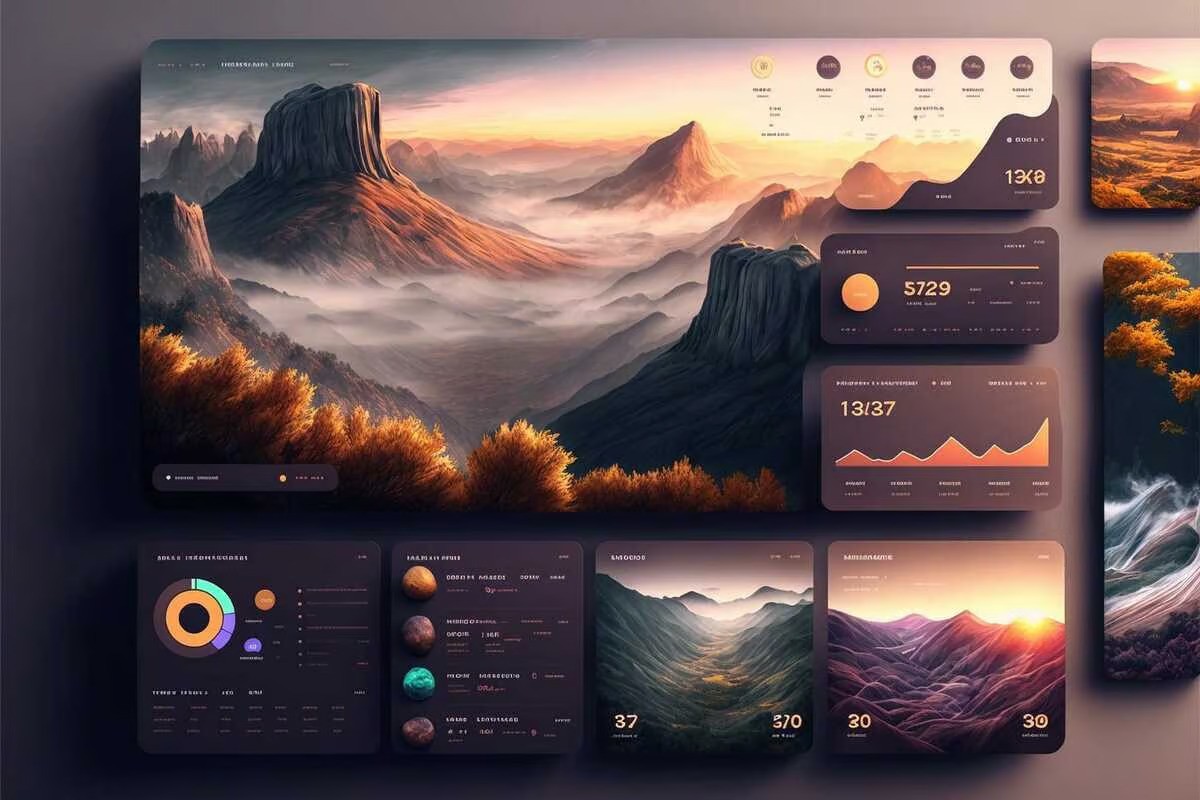
AI tools are becoming more popular in website design. They can help you create stunning websites that function well, even if you don't have any design experience.
One example of an AI-powered website builder is Durable, which uses AI to generate a website based on the user's answers to a few questions.
Another instance is Bookmark, a website builder that makes use of AI to build websites according to user preferences and industry.
While AI isn't able to replace human designers just yet, it can definitely make the web design process even better and improve the experience for users.
AI in video marketing
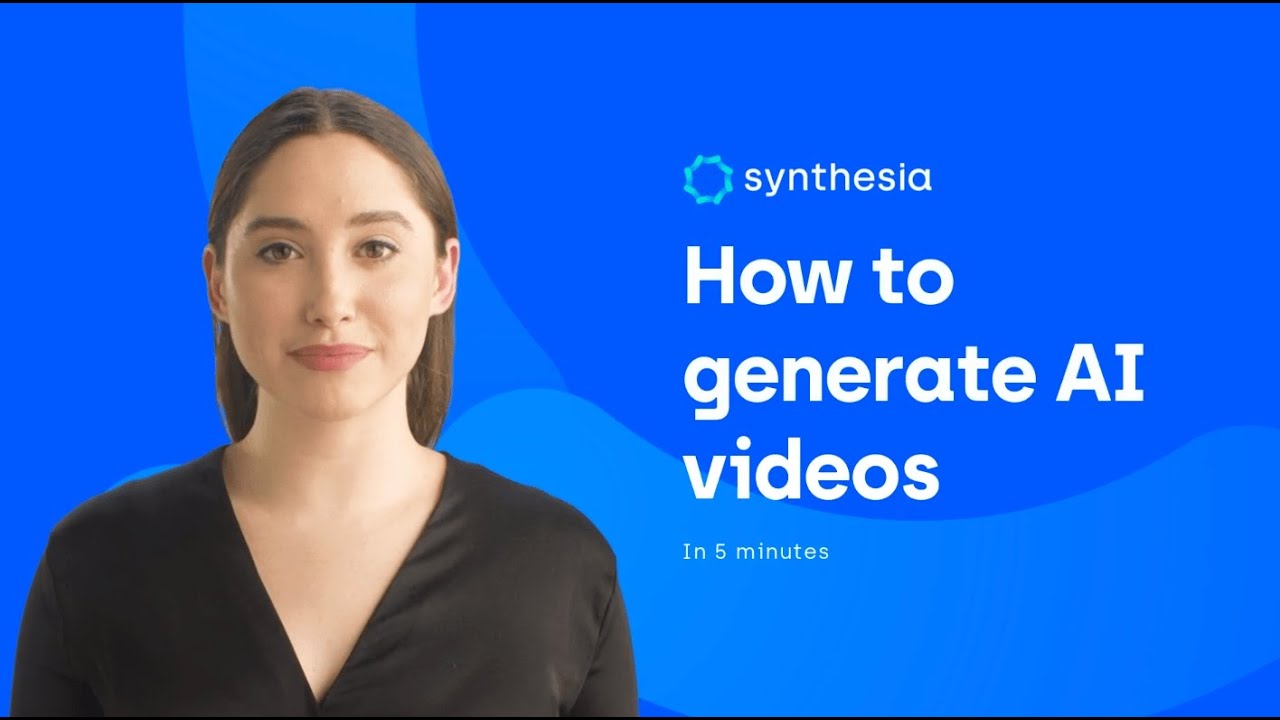
You'll be amazed at how AI is revolutionizing video marketing! Businesses are now using this technology to create more engaging and effective video content.
Just check out Synthesia and Elai, two AI-powered video creation platforms that turn your blog posts and other content into high-quality videos.
And if you're looking for compelling video marketing campaigns, Magisto's AI analyzes your footage to create one for you.
But that's not all! Unruly's AI-powered targeting technology ensures that your video ads are delivered to the right audience at the right time, resulting in better engagement and ROI.
Automated video creation
Traditional video creation can be a real hassle, taking up a lot of time and resources and requiring specialized skills and equipment.
But, with AI-powered video creation tools like Animoto and Promo.com, you'll be able to automate the process and make it much more accessible, regardless of your business size.
These platforms use AI to analyze images, text, and music, making it easy to create compelling videos quickly and efficiently.
AI-powered video editing
The video creation and editing process is time-consuming and requires specialized skills and software.
That's where AI-powered video editing comes in handy. By using AI technology, you'll automate the video editing process and improve the overall quality of your videos.
Two great examples of AI-powered video editing tools are Magisto and Adobe Express video editors. They analyze your footage, identify key moments, and suggest edits that create engaging videos.
You'll save both time and money while producing films that boost conversion rates and increase engagement.
Use cases of AI in email marketing
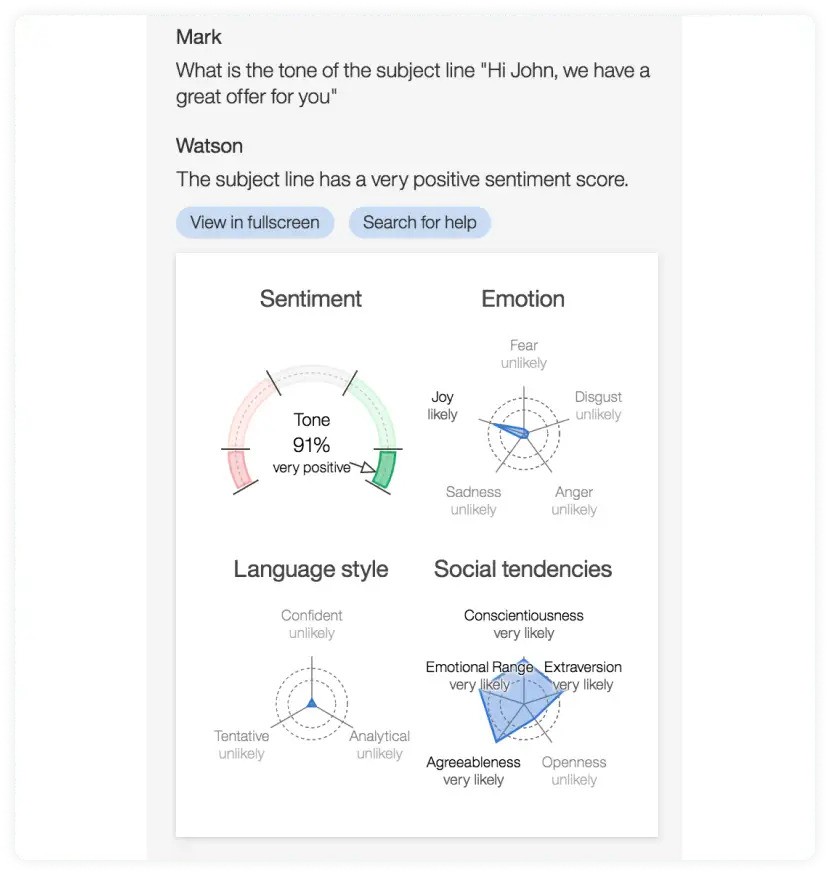
AI is rapidly transforming the world of email marketing, making it more efficient and effective than ever before.
AI allows you to personalize email campaigns and target specific customer segments with greater precision, leading to higher open rates and conversions.
For example, Grammarly, a writing assistant software, uses AI to personalize email content based on the user's writing style and preferences, resulting in a 40% increase in click-through rates.
Another example is The Hustle, a daily newsletter that uses AI to segment its audience and deliver personalized content, resulting in a 60% increase in open rates.
AI in email marketing is not only improving customer engagement but also streamlining processes, reducing costs, and increasing revenue for businesses.
Automated email campaigns
With AI-powered tools, you can easily segment your audience, personalize your messages, and optimize your campaigns for maximum engagement.
Plus, you'll save time and resources by automating the entire process. By leveraging the power of AI, you'll be able to deliver targeted messages that resonate with your subscribers and drive conversions.
AI-powered email subject lines
Email marketers often struggle to create subject lines that grab the attention of their audience due to the crowded nature of inboxes. This is where AI-powered email subject lines can help.
By leveraging artificial intelligence, subject lines can be optimized to improve open and click-through rates.
For instance, Airbnb used AI-powered subject lines to increase their email open rates by 11%, while Virgin Holidays experienced a 31% increase in click-through rates.
AI-powered subject lines analyze past email campaigns and use machine learning algorithms to identify and incorporate the elements that resonate most with the audience, such as personalized recommendations, urgency, and social proof.
Personalized email content
With inboxes flooded with marketing emails, it can be challenging to stand out and capture the attention of potential customers.
The problem is getting worse because people are getting more and more emails that don't matter to them. However, AI-powered email marketing can help address this issue by creating personalized email content that resonates with the recipient.
By analyzing data on the user's previous interactions with your brand, AI can tailor content to their specific interests and preferences.
A study found that personalized emails had a 29% higher open rate and 41% higher click rate than non-personalized emails.
Incorporating AI into email marketing can help businesses deliver more meaningful content and improve engagement.
Examples of AI used in email marketing
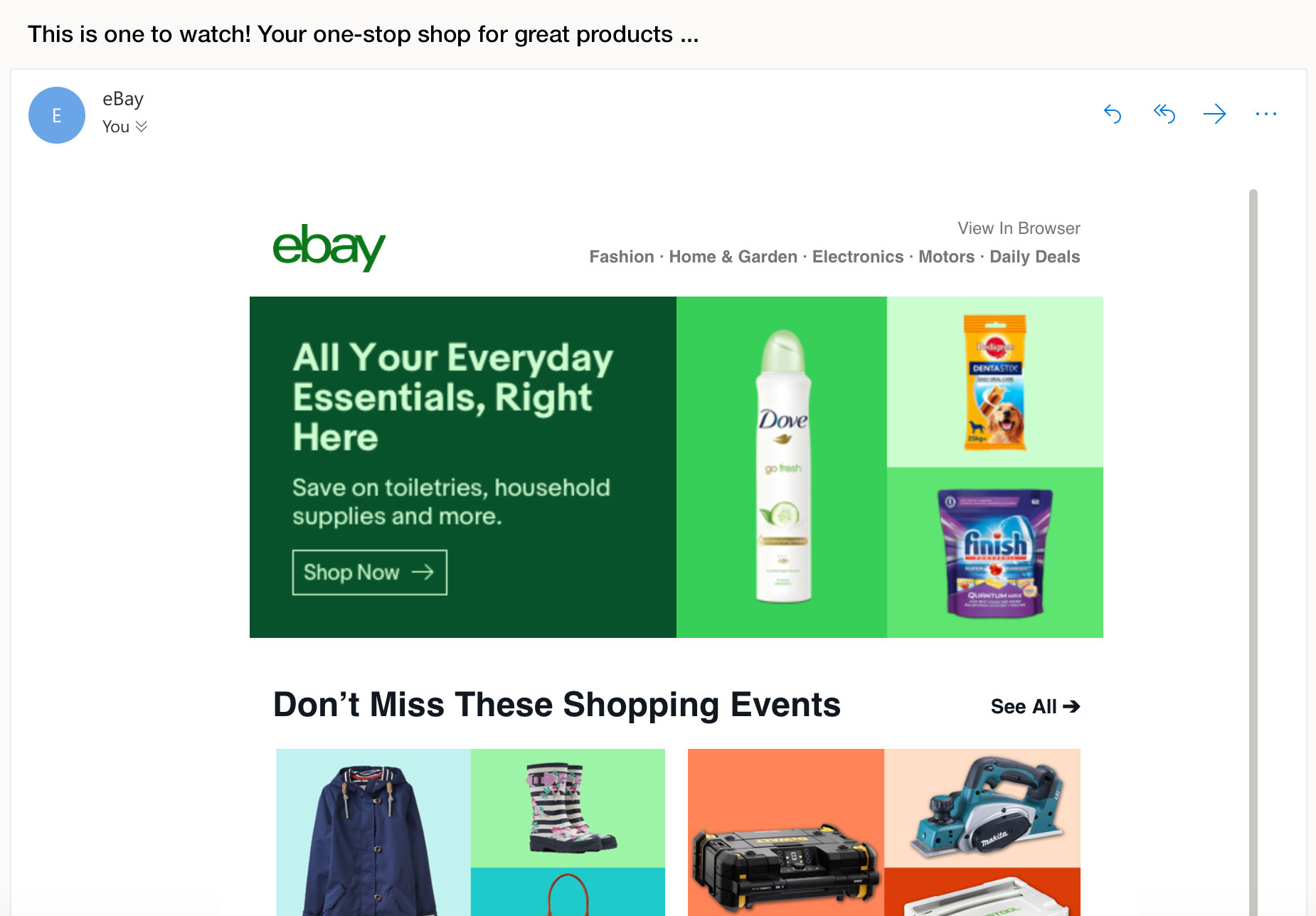
Ebay is working with AI-powered customer experience platform Phrasee to enhance its marketing copy, specifically email. With over 101 million email subscribers, crafting impactful subject lines to drive open rates is challenging.
eBay turned to Phrasee, which uses natural language generation and deep learning to create copy at scale while optimizing performance.
Another example, the American Marketing Association (AMA) struggled to personalize content for its 100,000+ newsletter subscribers due to the diversity of its content.
However, it has seen a 42% increase in monthly subscriber engagement rate by using rasa.io's AI engine to generate individualized subject lines based on member interest data.
AI in account-based marketing
According to a study by Forrester, companies that use AI in their account-based marketing see a 40% increase in win rates, a 70% increase in average deal size, and a 54% increase in pipeline.
One real-world example of AI in account-based marketing is Demandbase's ABM platform, which uses AI to analyze data and identify key accounts for targeting.
Another example is Terminus, which uses AI to personalize the content and messaging for each targeted account, resulting in higher engagement rates.
Use cases of AI used in account-based marketing
AI is being increasingly used in account-based marketing to improve targeting, personalization, and engagement rates. One example of AI in account-based marketing is LeanData's lead-to-account matching tool, which uses AI to match leads to the right accounts, resulting in a more effective targeting strategy.
Another example is Conversica's AI-powered sales assistant, which engages with leads and helps to qualify them, freeing up sales teams to focus on higher-value tasks.
By using AI in account-based marketing, companies can improve their targeting and personalization, resulting in higher engagement rates and ultimately, more revenue.
AI-powered account targeting
AI-powered account targeting is becoming increasingly popular in the world of account-based marketing. One of the main problems with traditional marketing approaches is that they often rely on broad targeting that doesn't take into account the unique needs and preferences of individual accounts.
This can lead to wasted resources and low engagement rates. AI solves this problem by analyzing vast amounts of data to identify the most relevant accounts for targeting.
One example of AI-powered account targeting is Marketo's solution, which uses AI to identify the best accounts to target based on historical data and predictive analytics.
Another example is Demandbase's ABM platform, which uses AI to analyze data and identify key accounts for targeting.
Build Marketing Workflows That Work for you

No credit card needed. Instant access. Try now for free
Digital First AI empowers marketers with AI-driven tools to centralize data, build personalized strategies, and execute campaigns seamlessly.
Generate content, automate workflows, and outpace competitors—all in one secure platform.
AI-Powered Data Room: Centralize and analyze unstructured data for actionable insights.
AI Strategy Canvases: Generate 26+ strategic canvases for tailored campaigns.
Advanced Research Tools: Conduct real-time market and competitor research.
AI Content & Visuals: Create high-quality copy and visuals with leading AI models.
Drag-and-Drop Workflow Builder: Design and automate custom workflows effortlessly.
Pre-Built Templates: Jumpstart campaigns with customizable templates.
Over 15,000 marketers and entrepreneurs from around the world are already reaping the benefits. Enjoy a free trial without any commitments!

